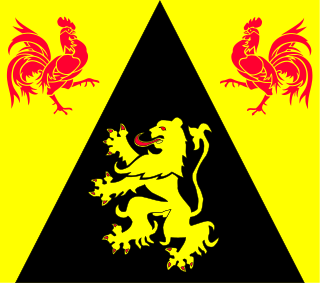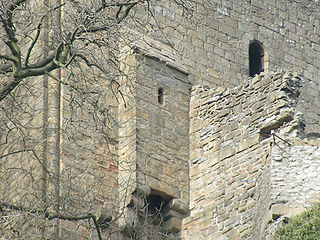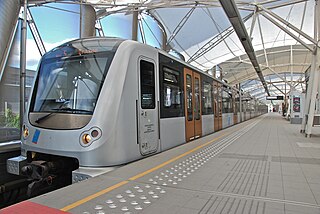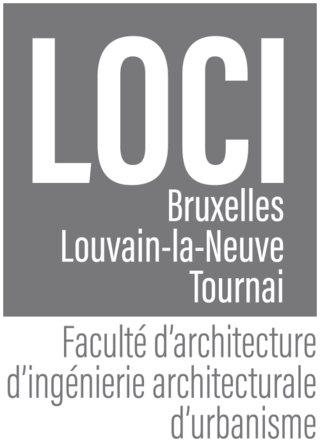An adjective is a word that describes or defines a noun or noun phrase. Its semantic role is to change information given by the noun.

Walloon Brabant is a province located in Belgium's French-speaking region of Wallonia. It borders on the province of Flemish Brabant and the provinces of Liège, Namur and Hainaut. Walloon Brabant's capital and largest city is Wavre.

The Catholic University of Leuven or Louvain was founded in 1834 in Mechelen as the Catholic University of Belgium, and moved its seat to the town of Leuven in 1835, changing its name to Catholic University of Leuven. In 1968, it was split into two universities, the Katholieke Universiteit Leuven and the Université catholique de Louvain, following tensions between the Dutch and French-speaking student bodies.

Louvain-la-Neuve is a planned town in the municipality of Ottignies-Louvain-la-Neuve, Wallonia, Belgium, situated 30 km southeast of Brussels, in the province of Walloon Brabant. The town was built to house the Université catholique de Louvain (UCLouvain) which owns the entire territory of the town; following the linguistic quarrels that took place in Belgium during the 1960s, and Flemish claims of discrimination at the Catholic University of Leuven, the institution was split into the Dutch language Katholieke Universiteit Leuven, which remained in Leuven, and the Université catholique de Louvain.

Belgian French, also known as Walloon French, is the variety of French spoken mainly among the French Community of Belgium, alongside related Oïl languages of the region such as Walloon, Picard, Champenois, and Lorrain (Gaumais). The French language spoken in Belgium differs very little from that of France or Switzerland. It is characterized by the use of some terms that are considered archaic in France, as well as loanwords from languages such as Walloon, Picard, and Dutch. The variety is also an official language in former Belgian colonies the Democratic Republic of the Congo, Rwanda and Burundi, with the latter two being co-official with English.

UCLouvain or Université catholique de Louvain is Belgium's largest French-speaking university. It is located in Louvain-la-Neuve, which was expressly built to house the university, and Brussels, Charleroi, Mons, Tournai and Namur. Since September 2018, the university has used the branding UCLouvain, replacing the acronym UCL, following a merger with Saint-Louis University, Brussels.

A studio apartment, or studio condo also known as a studio flat (UK), self-contained apartment (Nigeria), efficiency apartment, bed-sitter (Kenya), or bachelor apartment, is a small dwelling in which the normal functions of a number of rooms – often the living room, bedroom, and kitchen – are combined into a single room.

Garderobe is a historic term for a room in a medieval castle. The Oxford English Dictionary gives as its first meaning a store-room for valuables, but also acknowledges "by extension, a private room, a bed-chamber; also a privy".
Dunglish is a popular term for an English spoken with a mixture of Dutch. It is often viewed pejoratively due to certain typical mistakes that native Dutch speakers, particularly those from the Netherlands, make when speaking English. The term is first recorded in 1965, with other colloquial portmanteau words including Denglish, Dutchlish (1986), and Dinglish (2003).
Tweants is a group of non-standardised, closely related Westphalian, Dutch Low Saxon dialects, descending from Old Saxon.

The calotte is a skullcap worn by students at Catholic universities in Belgium. It originates from the skullcap worn by the Papal Zouave regiment around 1860. The calotte is cylindrical, made from velvet and astrakhan. The color of the top is bordeau red for the universities of Brussels, Leuven, Louvain-la-Neuve and Namur, white for the university of Ghent and emerald for the university of Liège. In the front of the calotte are stripes representing the Belgian flag and stripes representing the colors of the city or the university where the calotte has been received. At the back of the calotte, the faculty of the student is represented by a color and a symbol, with if needed an additional symbol to determine the speciality. Golden stars around the calotte represent the number of years that the student has studied successfully. In addition to that, a number of official and personal pins will be added to the calotte, all representing facts about its owner. Examples include:

UCLouvain Saint-Louis Brussels is an autonomous university campus specialized in social and human sciences part of UCLouvain and based in Brussels, Belgium.

Brussels has an extensive network of both private or public transportation means. Public transportation includes Brussels buses, trams, and metro, as well as a set of railway lines and railway stations served by public trains. Air transport is available via one of the city's two airports, and boat transport is available via the Port of Brussels. Bicycle-sharing and car-sharing public systems are also available. The city is relatively car-dependent by northern European standards and is considered to be the most congested city in the world according to the INRIX traffic survey.

KU Leuven is a Catholic research university in the city of Leuven, Belgium.
A theme-based shared flat is a unique concept created by the University of Louvain (UCLouvain) which consists in between six and twelve students sharing a "kot" and working together on a project. The project lasts for one (academic) year and can embrace cultural, social or humanitarian activities. There is a total of about 130 KàPs in Belgium gathering more than 1000 students. For example, one of them helps primary school students for their courses, another one takes care of handicapped people and yet another one is organizing sport events in Louvain-la-Neuve. Exchange students are particularly keen to find a place in one of these KàPs because it is an opportunity to integrate the Belgian culture and improve their French. As a result, some of the KàPs have a room reserved for exchange students only.

UCLouvain Bruxelles Woluwe, also known as Louvain-en-Woluwe or Alma, is a campus of the University of Louvain in Brussels, Belgium. The campus, built in the 1970s following the Leuven crisis, houses the Faculties of Medicine and Dentistry, Pharmacy and Biomedical Sciences and of Public Health, the Cliniques universitaires Saint-Luc, the university's main academic hospital, as well as many other institutions of higher education and a vast sports complex.

The Aula Magna is a postmodern building of the University of Louvain located in Louvain-la-Neuve, a section of the Belgian city of Ottignies-Louvain-la-Neuve, in Walloon Brabant. It holds one of the country's largest auditoria, with a maximum capacity of 1050 seats, and Wallonia's largest stage. Inaugurated in 2001, the complex was designed by Philippe Samyn.

The Louvain-la-Neuve Cyclotron is a brutalist architectural complex of the University of Louvain built from 1970 to 1972 in Louvain-la-Neuve, Walloon Brabant, Belgium, notably holding UCLouvain's CYCLONE particle accelerators. It is the first building completed by the university when it moved following the Leuven crisis and was the largest cyclotron in Europe at the time of its construction. The Louvain Cyclotron can also refer to Belgium's first cyclotron built in Louvain (Leuven) in 1947, which was replaced by the Louvain-la-Neuve center.

The Louvain School of Engineering or École polytechnique de Louvain (EPL) is a faculty of the University of Louvain, Belgium, founded in 1864. Known as the Faculty of Applied Sciences prior to 2008, it currently operates on the campuses of Louvain-la-Neuve and UCLouvain Charleroi.

The Faculty of Architecture, Architectural Engineering and Urban Planning, often called LOCI, is the 14th faculty of the University of Louvain, Belgium. It became an independent faculty in 2009, with the merger of three institutes founded between 1867 and 1882, and is active in Brussels (Saint-Gilles), Tournai and Louvain-la-Neuve.















